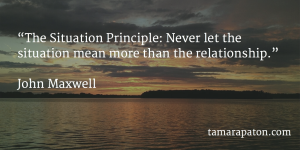

In my eight-year board career, I’ve joined six boards and parted ways with all but two. In one case, the board dissolved when we sold the company. In another, the organization merged with another party. And a few years ago, I elected to leave a group of colleagues whose values no longer aligned with my own.
Last week, I wrapped up my role with another board, one that I was terribly sad to leave. Despite putting my heart into the work, my best efforts didn’t measure up to the competitive pool of candidates wanting my seat. Although no job is 100% secure, the fleeting nature of board work is humbling.
Looking back, I learned a great deal as I balanced my disappointment with a desire to finish with class. A handful of key questions led my way.
What are my options for the length of my term?
When my board made its decision about my future, I had five months remaining in my term. That’s a very long runway for what felt like a walk of shame. Ideally, I would have compressed the timeframe of my departure.
If you find yourself in similar circumstances, consider asking to opt out of remaining meetings. Your (soon-to-be former) colleagues may appreciate your request even more than you do.
Give that I must continue, how can I show up fully?
I made a point of posing the first question in each meeting following my rejection. Doing so demonstrated my sustained commitment to the organization and eased some of the awkwardness. Had I coasted, I would have only validated the board’s decision to let me go.
At the same time, I don’t recommend becoming a robot. Pretending that everything is awesome is too exhausting to sustain. It’s not your responsibility to make other directors feel comfortable about what they did. For me, that meant focusing on the work and skipping social banter.
What insight can I glean from the board’s feedback?
After I had mourned the board’s decision for a few days, I shifted to a more generative mindset. In what ways had my performance on the board been lacking? How could I have come across better in my interview?
With self-flagellation out of the way, I examined the circumstances beyond my control. Do my my perceived shortcomings need to be fixed or is this a really a question of poor fit? What kinds of organizations would better appreciate my skills and capabilities?
Where’s my silver lining?
In the board meetings leading up to my departure, I felt a new sense of freedom. I no longer needed to preserve social capital with my peers, so I spoke frankly (very frankly, at times).
I also found solace in the support I received from the management team. Their empathy made a tough situation bearable and revealed the positive impact I had made on the organization. Without this setback, I never would have known how executives appreciated my contributions.
The experience also allowed me to see our CEO in a new light. His advice revealed how much careful thought he puts into his interaction with the board. When I left head office for the last time, I saw his huge heart and the reason so many employees would follow him anywhere. This piece of the experience is a gift I would never trade.
As my role on the board wound down, my husband encouraged me to take a victory lap of sorts. I roamed the city that feels like my second home. I spent time with a few colleagues who have become friends, rather than professional contacts. And I started to brainstorm what I will do differently in the future.
My next board role begins in a few days. I feel so fortunate to have a new chapter to write. And I’m grateful to close the previous one, satisfied with my efforts and stronger because of them.
Thank you for reading! If you found this post useful, please share it with others in your network. Doing so helps my work reach others and would mean so much to me.








